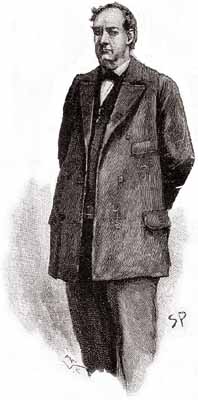| The Greek Interpreter 2 | The Greek Interpreter 3 |
We had reached Pall Mall as we talked, and were walking down it from the St. James’s end. Sherlock Holmes stopped at a door some little distance from the Carlton, and, cautioning me not to speak, he led the way into the hall. Through the glass panelling I caught a glimpse of a large and luxurious room, in which a considerable number of men were sitting about and reading papers, each in his own little nook. Holmes showed me into a small chamber which looked out into Pall Mall, and then, leaving me for a minute, he came back with a companion whom I knew could only be his brother.

Mycroft Holmes was a much larger and stouter man than Sherlock. His body was absolutely corpulent, but his face, though massive, had preserved something of the sharpness of expression which was so remarkable in that of his brother. His eyes, which were of a peculiarly light, watery gray, seemed to always retain that far-away, introspective look which I had only observed in Sherlock’s when he was exerting his full powers.
“I am glad to meet you, sir,” said he, putting out a broad, fat hand like the flipper of a seal. “I hear of Sherlock everywhere since you became his chronicler. By the way, Sherlock, I expected to see you round last week to consult me over that Manor House case. I thought you might be a little out of your depth.”
“No, I solved it,” said my friend, smiling.
“It was Adams, of course.”
“Yes, it was Adams.”
“I was sure of it from the first.” The two sat down together in the bow-window of the club. “To anyone who wishes to study mankind this is the spot,” said Mycroft. “Look at the magnificent types! Look at these two men who are coming towards us, for example.”
“The billiard-marker and the other?”
“Precisely. What do you make of the other?”
The two men had stopped opposite the window. Some chalk marks over the waistcoat pocket were the only signs of billiards which I could see in one of them. The other was a very small, dark fellow, with his hat pushed back and several packages under his arm.
“An old soldier, I perceive,” said Sherlock.
“And very recently discharged,” remarked the brother.
“Served in India, I see.”
“And a non-commissioned officer.”
“Royal Artillery, I fancy,” said Sherlock.
“And a widower.”
“But with a child.”
“Children, my dear boy, children.”
“Come,” said I, laughing, “this is a little too much.”
“Surely,” answered Holmes, “it is not hard to say that a man with that bearing, expression of authority, and sun-baked skin, is a soldier, is more than a private, and is not long from India.”
“That he has not left the service long is shown by his still wearing his ammunition boots, as they are called,” observed Mycroft.
“He had not the cavalry stride, yet he wore his hat on one side, as is shown by the lighter skin on that side of his brow. His weight is against his being a sapper. He is in the artillery.”
“Then, of course, his complete mourning shows that he has lost someone very dear. The fact that he is doing his own shopping looks as though it were his wife. He has been buying things for children, you perceive. There is a rattle, which shows that one of them is very young. The wife probably died in childbed. The fact that he has a picture-book under his arm shows that there is another child to be thought of.”
I began to understand what my friend meant when he said that his brother possessed even keener faculties than he did himself. He glanced across at me and smiled. Mycroft took snuff from a tortoise-shell box and brushed away the wandering grains from his coat front with a large, red silk handkerchief.
“By the way, Sherlock,” said he, “I have had something quite after your own heart – a most singular problem – submitted to my judgment. I really had not the energy to follow it up save in a very incomplete fashion, but it gave me a basis for some pleasing speculations. If you would care to hear the facts– –”
“My dear Mycroft, I should be delighted.”
The brother scribbled a note upon a leaf of his pocket-book, and, ringing the bell, he handed it to the waiter.
“I have asked Mr. Melas to step across,” said he. “He lodges on the floor above me, and I have some slight acquaintance with him, which led him to come to me in his perplexity. Mr. Melas is a Greek by extraction, as I understand, and he is a remarkable linguist. He earns his living partly as interpreter in the law courts and partly by acting as guide to any wealthy Orientals who may visit the Northumberland Avenue hotels. I think I will leave him to tell his very remarkable experience in his own fashion.”
A few minutes later we were joined by a short, stout man whose olive face and coal black hair proclaimed his Southern origin, though his speech was that of an educated Englishman. He shook hands eagerly with Sherlock Holmes, and his dark eyes sparkled with pleasure when he understood that the specialist was anxious to hear his story.
“I do not believe that the police credit me – on my word, I do not,” said he in a wailing voice. “Just because they have never heard of it before, they think that such a thing cannot be. But I know that I shall never be easy in my mind until I know what has become of my poor man with the sticking-plaster upon his face.”
“I am all attention,” said Sherlock Holmes.
| The Greek Interpreter 2 | The Greek Interpreter 3 |